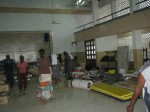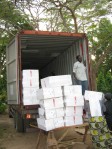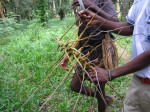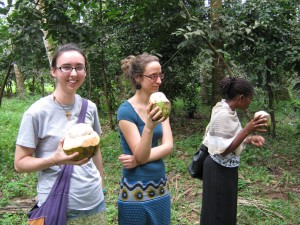I’m sitting here astounded at the fact that I’ve been here for 7 weeks already. My time here in Machui has gone by in the blink of an eye and I’m trying to savor my last days here. After a quiet few weeks, things are starting to pick up around here. The children in the kindergarten started school yesterday and the college students came back today to prepare for classes tomorrow. I’m still not quite sure what I’m doing with them but we’ll see what happens!
Looking back on the last week, a lot has happened since my last post about the Spice Farm.
Last Sunday we celebrated The Feast of the Precious Blood properly. There is another community of Precious Blood serving in a village a few minutes away from Machui, called Welezo. We joined the Sisters there for the Feast. Their main ministry is running an old age home and we took a tour of it while we were there. One man, who had fallen out of a tree and broken his leg, wanted me to take a picture:
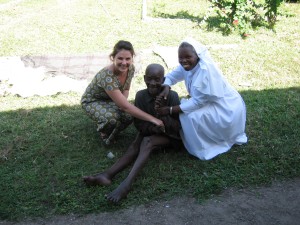 Strangely, I think this is the place where I have been most exposed to the poverty of the people. Some of the Wazee(Elderly people in Swahili) couldn’t get out of bed and were riddled with disease. It’s important in situations like that to look the person in the eye and treat him or her normally, to preserve that person’s human dignity. The respectful greetings for your elders in Swahili is “Shikamo”, to which they respond, “Marahaba”. We went around to the rooms greeting people in this way and they were delighted to find that I can speak a little Swahili. Knowing that I brought a little joy to their day was wonderful.
Strangely, I think this is the place where I have been most exposed to the poverty of the people. Some of the Wazee(Elderly people in Swahili) couldn’t get out of bed and were riddled with disease. It’s important in situations like that to look the person in the eye and treat him or her normally, to preserve that person’s human dignity. The respectful greetings for your elders in Swahili is “Shikamo”, to which they respond, “Marahaba”. We went around to the rooms greeting people in this way and they were delighted to find that I can speak a little Swahili. Knowing that I brought a little joy to their day was wonderful.
On Tuesday, yet another visitor arrived in Machui but this time it was a familiar face for most of the people here. The visitor was a Sister from Austria who lived in Machui for nineteen years. She was here from the beginning, when everything was just starting to be built. As I’m sure you can imagine, talking with her was very interesting. She is a nurse and worked in the dispensary while she was here. Since I’m helping there now took a special interest in me. In the afternoon, after I was done working, she invited me to take a walk around the compound with her. As we ran into people she knew, watching her interact with them was delightful.
The German benefactor of the Sisters that I mentioned in my posts is still here and planning many things for Machui. He wants to build another water tank, new classrooms and add rooms to the dispensary. He even put together a 35 ton container of supplies from Germany to be sent here! After a week of stress because they were having trouble collecting the container after it arrived, a truck finally pulled in on Saturday carrying it. The huge container was full of tiles, pipes, bags of cement and building materials. I was amazed at the generosity of this man. This isn’t the first time he has done this either. For at least fifty years, he has been assisting the Sisters and practically built the entire compound here in Machui. He is truly an inspiration and I only wish that more people were as generous.
Here are some pictures of us unloading the supplies:
